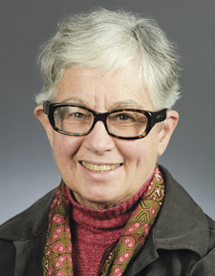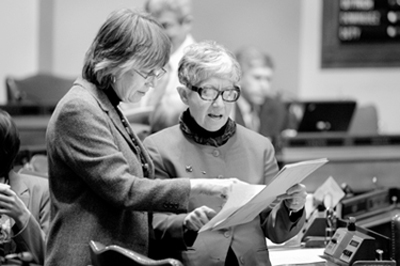By MORDECAI SPECKTOR
Rep. Phyllis Kahn does not have a DFL primary opponent this year, but she is not taking the upcoming election contest lightly. She will be sending out a preprimary postcard to her constituents in District 59B, which is comprised of neighborhoods in South and Southeast Minneapolis, including picturesque Nicollet Island, where Kahn has her home.
The Minnesota primary elections have been moved up to Aug. 10, and Kahn wants to remind voters that the polls will be open on the second Tuesday in August.
First elected to the Minnesota Legislature in 1972, Kahn is in her 19th term and shares seniority of tenure in the House of Representatives with Rep. Lyndon Carlson, DFL-Crystal. (Sen. Linda Berglin, DFL-Minneapolis, also was elected to the House in 1972, and then elected to the Senate in 1980.)
For the general election, Kahn plans to print a “fuller campaign piece” with more information about the issues and her endorsements from various groups. She will face challengers from the Independence, Green and Republican parties. Over recent election cycles, she has garnered 58 to 60 percent of the vote.
During an interview with the American Jewish World last week, the Jewish legislator discussed her long incumbency in the House, her reputation for unorthodox legislative proposals and future plans.

The New York City native, who retains traces of her Brooklyn accent, recalled that the motivation to run for elective office came as a result of what she termed “rampant sexual discrimination” at the University of Minnesota, where she was employed as a research associate in genetics and cell biology. Kahn is a graduate of Cornell University, and has a doctorate in biophysics from Yale University.
After happily working at the U of M for some years, Kahn realized that she was not in a “tenure track position,” despite having the same credentials and qualifications as male colleagues who were advancing in their careers.
So, dealing with career impediments at the U, and in the midst of the emerging women’s movement , Kahn decided that electoral politics “might be a more useful way to create change. So, I filed and ran and won.”
For a year or two, she juggled her U of M and legislative jobs, but found that serving in the House was much more than a “part-time job,” as some had suggested.
The Minnesota Legislature was a different world in 1973, when Rep. Kahn was shown to her desk on the House floor. There was exactly one woman serving in 1972 — Rep. Helen McMillan, from Austin.
“Six of us were elected at once,” Kahn recalled, regarding the emergence of female legislators in 1972. “You would have thought we were taking over the place, the way people reacted.”
The 1972 elections also marked a DFL takeover of state government, with Democrats controlling both the House and Senate, and Wendell Anderson in the governor’s office.
“Everything was different,” said Kahn, who noted that House Speaker Martin Sabo “was very amenable to women’s rights,” and appointed Kahn and her female House colleagues to important committees. With the DFL in the driver’s seat, Kahn said a backlog of labor and environmental proposals were passed through the legislature and signed into law.
On another facet of women in state government, Kahn hopes that Minnesota elects its first-ever woman governor this year; she is a supporter of the DFL-endorsed candidate, House Speaker Margaret Anderson Kelliher.

The 73-year-old legislator now chairs the State Government Finance Division, and serves on several other House committees.
Regarding her legislative work, Kahn says that she focuses on “most of the really boring stuff that no one else is willing to work on.” Specifically, Kahn has applied her scientific intellect to improving state government information systems.
Her passion and skills were recognized by Governing magazine, which selected Kahn as one of eight Public Officials of the Year. The Governing article recognizing the Minneapolis legislator noted that her accomplishments include helping to pass the “state’s first computer-crime law and the 1975 Clean Indoor Air Act, the nation’s first law to mandate nonsmoking sections in public places such as restaurants. But she’s best known as a champion of women’s rights issues. She won landmark victories cracking down on anti-female violence, creating gender equity for sports funding, and establishing a woman’s right to keep her own name after marriage.”
Among other honors, the Children’s Defense Fund-Minnesota named Kahn their 2007 Legislative Children’s Champion.
Kahn is also known around the state for occasionally authoring a bill that attracts press attention for its quirky aspect — like granting the vote to 12-year-olds.
“I changed that and it still didn’t move [in the Legislature],” she replies, regarding enfranchising the middle-school set. The impetus for the bill, recalled Kahn, was a budget measure that would hurt children, “and my husband said, ‘It’s good that they can’t vote.’ And I said, ‘Well, we should give them the right to vote.’”
Kahn initially picked the age of 12, after reading a rule mandating that all state government publications be written for a sixth-grade reading level. “I still believe that 12 would be fine,” she said, but has modified her bill to allow voting at age 16.
“Sixteen is much more reasonable… If we trust them to drive at age 16, why wouldn’t we trust them to vote? An irresponsible driver can do much more harm than an irresponsible voter.”
There have been committee hearings on her perennial bill to lower the voting age to 16; but Kahn acknowledges that chances of the measure’s passage are slim, even with the dedicated youthful constituency working on it.
Kahn is one of 11 Jewish legislators — all DFLers — at the Capitol: her House colleagues include Frank Hornstein, Jeremy Kalin (who is not running for reelection), Tina Liebling, Michael Paymar, Paul Rosenthal and Steve Simon; in the Senate are Terri Bonoff, Richard Cohen, Ron Latz and Sandy Pappas.
The legislature has become a friendlier place for Jews over the years, according to Kahn. There was a rocky period in 2000, when House members engaged in a spat over the type of prayer offered for opening House floor sessions. When I worked for the House Public Information Office, in 1994-1995, Christian ministers and priests often would say a prayer in the name of Jesus Christ. The House rules were then amended to call for a nondenominational prayer that reflects “the religious diversity of the House.”
In 2000, Arlon Lindner, a Republican from Corcoran, became a key figure in the proposal to restore the sectarian opening prayer. During a heated exchange on the House floor, Lindner, who is no longer a House member, turned to Rep. Michael Paymar, from St. Paul, and said, “… don’t impose your irreligious left views on me.” Lindner, who was later summoned before the House Ethics Committee, later said that he was responding to Paymar’s use of the term “religious right,” which the member from Corcoran took as derogatory.
A number of Republican legislators took the view that Jewish members could simply leave the House chamber if they didn’t like the prayer being offered — they could go stand in the hallway. In the end, the ethics panel took no action against Rep. Lindner (3-31-2000 AJW). In 2003, Lindner again was denounced by House colleagues, and by the Jewish Community Relations Council, for his assertion that homosexuals were not persecuted by the Nazis, a contention that contradicted well-established historical facts.
With an influx in Jewish membership, and “as people are a little more sensitive,” the House has become a friendlier place for Members of the Tribe, Kahn said.
“One of the problems is that people don’t quite realize that Jewish holidays start the night before the date that’s on the calendar,” she remarked.
Kahn recalled that many years ago, the aide to the House speaker checked with the Jewish representatives about a proper time for adjourning before Passover. The aide was confounded by the fact that the male Jewish reps wanted to break at 5 p.m., but all of the women wanted to get out of the Capitol by 2 p.m. Kahn told the aide, in reference to who needed to prepare the seder meal: “It shows you that things are not as equal as we’d like them to be.”
In any case, Kahn joined most of the Jews in the Minnesota Legislature, along with several non-Jewish members, in a trip to Israel last November (11-27-09 AJW). The delegation got a more nuanced understanding of the long-running Israeli-Palestinian conflict, saw some of the major attractions in Israel and the West Bank, and visited some high-tech firms with ties to Minnesota.
When she is not dealing with legislative business, Kahn likes to run, including competing in two Twin Cities marathons. The fit lawmaker also is an enthusiastic bicyclist and hockey player. She and her husband, Don, were married in 1956; they have two married children, Tamar, who lives in Oregon, and Jeremy, who resides in Montreal, Canada; and six grandchildren.
After serving 38 years in the state House, Kahn admitted that she had grown tired of being part of the minority party.
“Then when we got into the majority, I thought it was going to be so great, but this Republican governor has made it pretty awful. So, I’d really like to have at least one session where you could do serious problem-solving work,” she said, hoping for a scenario where the DFL controls both houses of the Legislature and the governorship. She acknowledged that the immense budget deficit that is looming will complicate legislative work in 2011.
Beyond 2010, and her likely 20th House term, Kahn mentioned “one absolute thing” about her political career: She will not move from Nicollet Island if the boundaries of her House district are changed.
“That’s the one thing I won’t do,” she said decisively.
(American Jewish World, 7.23.10)



















Phyllis Kahn is that rare political representative who is willing to roll up her sleeves and do the hard work necessary to help the people she serves – honestly, and fervently – every day, without any ulterior motive. Admirable, a credit to women, and men who care about good government.
I enjoyed reading the article .
Ruth Usem
I don’t care how great a representative may be, 19 terms is way too long for anyone to be in office!